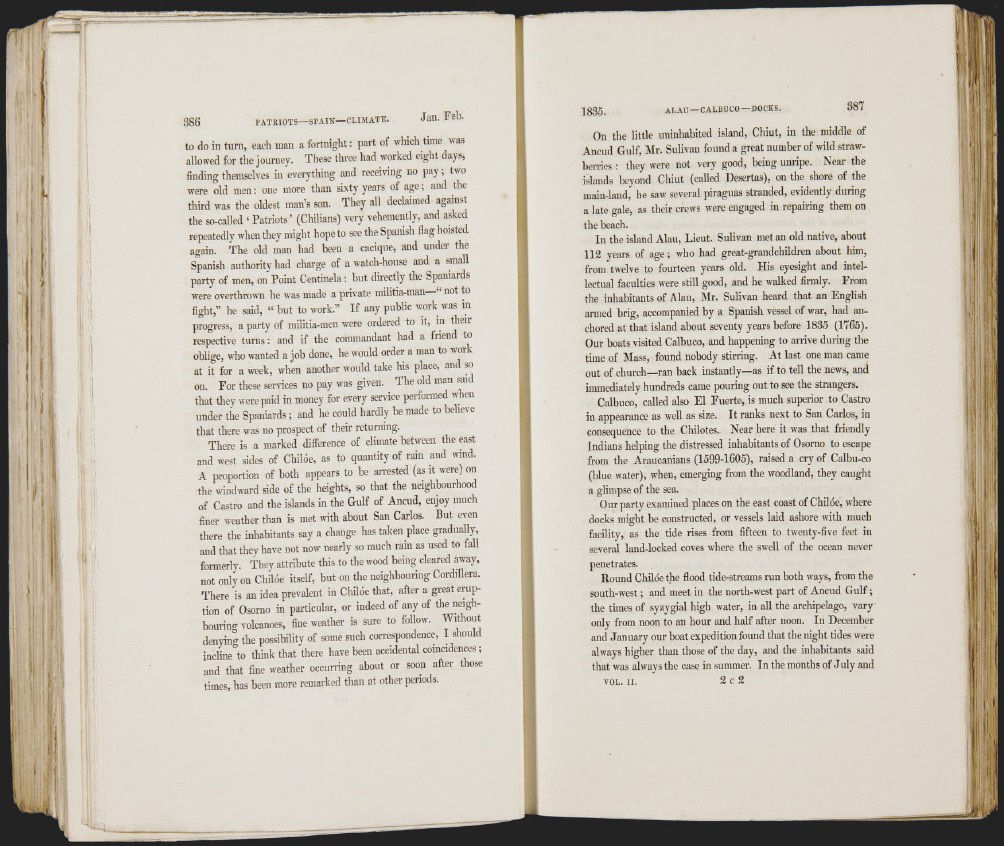
i
! . íi
i
» ■
If»(
386 PATRIOTS— SPAIN--CLIMATE. Jail. E®b.
to do in turn, each man a fortnight: part of which time was
allowed for the journey. Tliese three had worked eight days,
finding tliemselres in everything and receiving no pay; two
were old men: one more than sixty yeai's of age; and the
third was the oldest man’s son. They all declaimed against
the so-called ‘ Patriots’ (Chilians) very vehemently, and asked
repeatedly when they might hope to see the Spanish flag hoisted
again. The old man had heen a cacique, and under the
Spanish authority had charge of a watch-house and a small
party of men, on' Point Centinela: hut dirertly the Spaniards
were overthrown he was made a private militia-man ‘ not to
fight,” he said, “ but to work.” I f any public work was m
progress, a party of militia-men were ordered to it, in their
respective turns: and if the commandant had a friend to
oblige, who wanted a job done, he would order a man to work
at it for a week, when another would take his place, and so
on. For these services no pay was given. ^ The old man said
that they were paid in money for every service performed when
under the Spaniards; and he could hardly he made to believe
that there was no prospect of their returning.
There is a marked difference of climate between the east
and west sides of Chilóe, as to quantity of rain and wind.
A proportion of hoth appears to he arrested (as it were) on
the windward side of the heights, so that the neighbourhood
of Castro and the islands in the Gulf of Ancud, enjoy much
finer weather than is met with about San Carlos. But even
there the inhabitants say a change has taken place gradually,
and that they have not now nearly so much rain as used to fall
formerly. They attribute this to the wood being cleared away,
not only on Chilóe itself, but on the neighbouring Cordillera.
There is an idea prevalent in Chilóe that, after a great erop-
tion of Osorno in particular, or indeed of any of neighbouring
volcanoes, fine weather is sure to follow. Without
denying the possibility of some such correspondence, I should
incline to think that there have been accidental coincidences ;
and that fine weather occurring about or soon after those
times, has heen more remarked than at other periods.
On the little uninhabited island, Chiut, in the middle of
Ancud Gulf, Mr. Sulivan found a great number of wild strawberries
: they were not very good, being unripe. Near the
islands beyond Chiut (called Desertas), on the shore of Bie
main-land, he saw several piraguas stranded, evidently during
a late gale, as their crews were engaged in repairing them on
the beach.
In the island Alau, Lieut. Sulivan met an old native, about
112 yeai-s of age ; who had great-grandchildren about him,
from twelve to fourteen years old. His eyesight and intellectual
faculties were still good, and he walked firmly. From
the inhabitants of Alau, Mr. Sulivan heard that an English
armed brig, accompanied by a Spanish vessel of war, had anchored
at that island about seventy years before 1835 (1765).
Our boats visited Calbuco, and happening to arrive during the
time of Mass, found nobody stirring. At last one man came
out of church—ran back instantly—as if to tell the news, and
immediately hundreds came pouring out to see the strangers.
Calbuco, called also El Fuerte, is much superior to Castro
in appearance as well as size. It ranks next to San Carlos, in
consequence to the Chilotes. Near here it was that friendly
Indians helping the distressed inhabitants of Osorno to escape
from the Araucanians (1599-1605), raised a cry of Calbu-co
(blue water), when, emerging from the woodland, they caught
a glimpse of the sea.
Our party examined places on the east coast of Chilóe, where
docks might he constructed, or vessels laid ashore with much
facility, as the tide rises from fifteen to twenty-five feet in
severid land-locked coves where the swell of the ocean never
penetrates.
Round Chiloe the flood tide-streams run both ways, from the
south-west; and meet in the north-west part of Ancud Gulf;
the times of syzygial high water, in all the archipelago, vary
only from noon to an hour and half after noon. In December
and January our boat expedition found that the night tides were
always higher than those of the day, and the inhabitants said
that was always the case in summer. In the months of July and
VOL. I I . 2 c 2
Iit
Ilii i ii
I ril;
I*. I